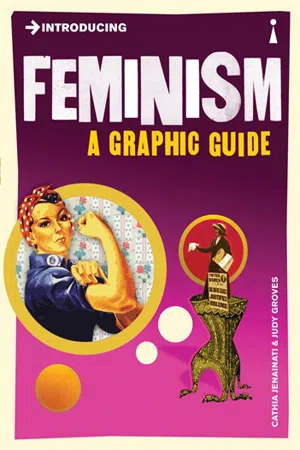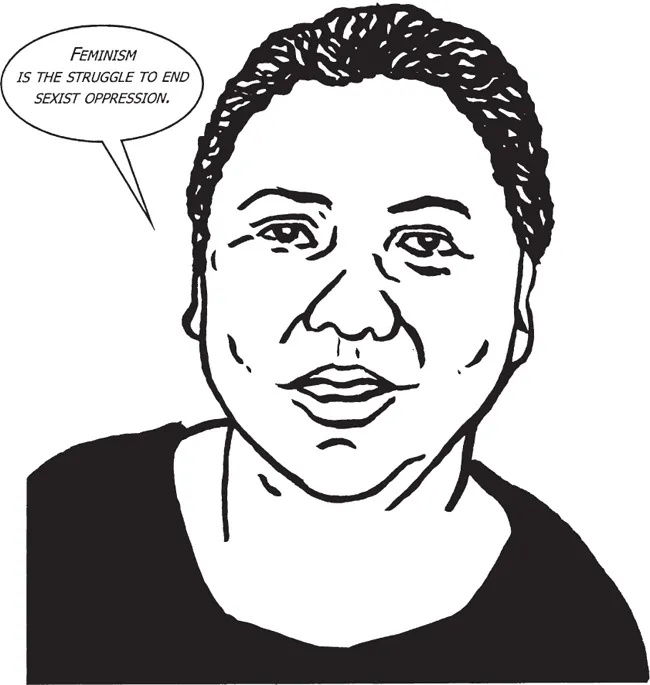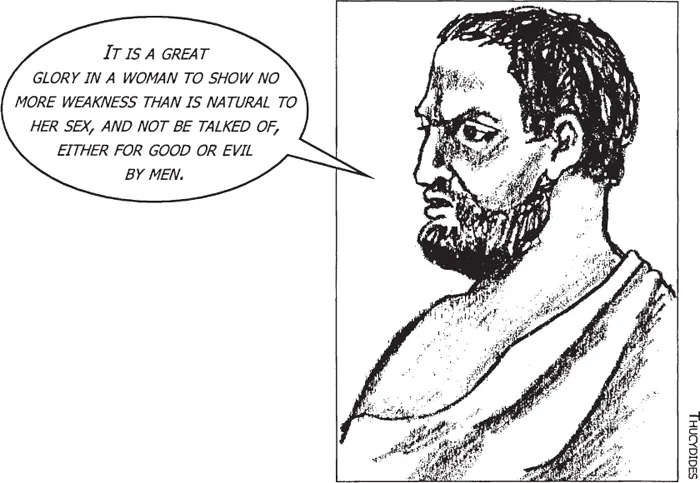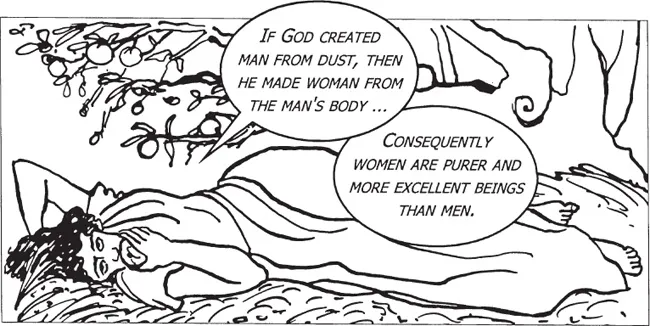
- 176 pages
- English
- ePUB (mobile friendly)
- Available on iOS & Android
eBook - ePub
About this book
The term 'feminism' came into English usage around the 1890s, but women's conscious struggle to resist discrimination and sexist oppression goes much further back. This completely new and updated edition of "Introducing Feminism" surveys the major developments that have affected women's lives from the 17th century to the present day. "Introducing Feminism" is an invaluable reference book for anyone seeking the story of how feminism reconfigured the world for women and men alike.
Tools to learn more effectively

Saving Books

Keyword Search

Annotating Text

Listen to it instead
Information
What is Feminism?
Any attempt to “introduce feminism” invariably faces numerous challenges. Where to start, who to include, what to leave out and when to stop are all important considerations. This book provides an overview of the development of feminist activism in the Anglo-speaking world. It specifically outlines feminist thought in Britain and the US, although it refers to international contexts where relevant.
The book acknowledges and intends to celebrate the variety of feminist perspectives which have developed throughout women’s history, taking as its premise bell hooks’ famous definition.

FEMINISM IS THE STRUGGLE TO END SEXIST OPPRESSION.
Introducing Feminism traces the historical and social development of this struggle.
What is Patriarchy?
One starting point for thinking about feminist activity is coming to a consensus about what the term “patriarchy” means. A useful definition is provided by Chris Weedon.

“PATRIARCHAL REFERS TO POWER RELATIONS IN WHICH WOMEN’S INTERESTS ARE SUBORDINATED TO THE INTERESTS OF MEN.”
“THESE POWER RELATIONS TAKE ON MANY FORMS, FROM THE SEXUAL DIVISION OF LABOUR AND THE SOCIAL ORGANIZATION OF PROCREATION TO THE INTERNALIZED NORMS OF FEMINITY BY WHICH WE LIVE.”
“PATRIARCHAL POWER RESTS ON SOCIAL GIVEN TO BIOLOGICAL SEXUAL DIFFERENCE.”
“THESE POWER RELATIONS TAKE ON MANY FORMS, FROM THE SEXUAL DIVISION OF LABOUR AND THE SOCIAL ORGANIZATION OF PROCREATION TO THE INTERNALIZED NORMS OF FEMINITY BY WHICH WE LIVE.”
“PATRIARCHAL POWER RESTS ON SOCIAL GIVEN TO BIOLOGICAL SEXUAL DIFFERENCE.”
The term “feminism” came into English usage around the 1890s, but women’s conscious struggle to resist discrimination and sexist oppression goes much further back.
Biology is Destiny
As early as the 4th century BC, Aristotle (384–322 BC) declared that “women were women by virtue of a certain lack of qualities”. His predecessor the Greek historian and army general Thucydides (c. 460–400 BC) had some advice for women.

IT IS A GREAT GLORY IN A WOMAN TO SHOW NO MORE WEAKNESS THAN IS NATURAL TO HER SEX, AND NOT BE TALKED OF, EITHER FOR GOOD OR EVIL BY MEN.
Early thinking about the difference between women and men was based on essentialist ideas about gender which maintained that women’s and men’s differences are a result of biology. The belief that biology is destiny suggests that, in comparable situations, men exhibit “masculine” psychological traits such as aggressiveness, rationality and assertiveness, whereas women will exhibit “feminine” traits such as gentleness, intuitiveness and sensitivity. These differences, it was believed, translated into particular patterns of thought, feeling and behaviour specific to each gender.
Logic or Emotion?
Essentialism sees men as able to think logically, abstractly and analytically, while women are mainly emotional, compassionate and nurturing creatures.

IT IS IMPORTANT TO MAINTAIN DISTINCTIONS BETWEEN THE SEXES IN ORDER TO PRESERVE THE NATURAL ORDER.
Essentialist thinking had repercussions on women’s private and public lives. In private, essentialist ideas were translated into rule sof conduct for the woman as wife, mother and daughter. In public, it was believed that women’s participation should be limited and strictly controlled by a masculine representative of authority such as husband, father, the clergy, the law.

Essentialist ideas about women permeated Western thought for centuries and proposed that there is a natural, biologically determined essence of the feminine that is universal and unchangeable.
Feminists have long fought to dispel such myths about gender.
Early Modern Feminist Activity
Early Modern (1550–1700) English society was founded on the rule of the father.

MAN IS THE HEAD OF THE HOUSEHOLD ...
... JUST AS THE MONARCH IS THE HEAD OF STATE AND JESUS HEAD OF THE CHURCH.
... JUST AS THE MONARCH IS THE HEAD OF STATE AND JESUS HEAD OF THE CHURCH.
Women had no formal rights and were not represented in the law. Even if some women were able to receive a higher education, they were not allowed to receive the degree for which they studied. In marriage, the woman’s body belonged to her husband, who was also the only legal guardian of the children.
Early Modern feminist activity aimed at challenging the prevalent social view that women are weak and irrational creatures who should be controlled by men. There were a number of political events which supported such efforts, in particular Queen Elizabeth I’s accession to the throne in 1558 and her long and successful reign as a single female.

THEN THERE WAS THE ENGLISH CIVIL WAR AND THE INTERREGNUM PERIOD OF 1642–60 AND THE GLORIOUS REVOLUTION OF 1688...
THESE EVENTS QUESTIONED THE SUPREME POWER OF THE KING AND DEMONSTRATED THAT IT WAS POSSIBLE TO CHALLENGE PATRIARCHAL RULE.
THESE EVENTS QUESTIONED THE SUPREME POWER OF THE KING AND DEMONSTRATED THAT IT WAS POSSIBLE TO CHALLENGE PATRIARCHAL RULE.
Reinterpreting the Bible
Writing on women’s issues in the late 16th century began to proliferate, with a number of essays challenging the ideal of the female as “chaste, silent and obedient”. In 1589, Jane Anger’s Her Protection for Women reinterpreted Genesis.

IF GOD CREATED MAN FROM DUST, THEN HE MADE WOMAN FROM THE MAN’S BODY ...
CONSEQUENTLY WOMEN ARE PURER AND MORE EXCELLENT BEINGS THAN MEN.
CONSEQUENTLY WOMEN ARE PURER AND MORE EXCELLENT BEINGS THAN MEN.
Rachel Speght’s A Muzzle for Melastomus (1617) questioned the story of Adam’s fall from the Garden of Eden, taking issue with the underlying assumption that Adam had been seduced by Eve to eat the apple: “If Adam has not approved of that deed which Eve has done, and been willing to tread the steps which she had gone, he being her head would have reproved her.”
The gender of authors such as Jane Anger, Rachel Speght, Esther Sowernam and Sarah Egerton remains debatable. Some crit...
Table of contents
- Cover
- Title Page
- Copyright
- Contents
- What is Feminism?
- Further Reading
- Index
Frequently asked questions
Yes, you can cancel anytime from the Subscription tab in your account settings on the Perlego website. Your subscription will stay active until the end of your current billing period. Learn how to cancel your subscription
No, books cannot be downloaded as external files, such as PDFs, for use outside of Perlego. However, you can download books within the Perlego app for offline reading on mobile or tablet. Learn how to download books offline
Perlego offers two plans: Essential and Complete
- Essential is ideal for learners and professionals who enjoy exploring a wide range of subjects. Access the Essential Library with 800,000+ trusted titles and best-sellers across business, personal growth, and the humanities. Includes unlimited reading time and Standard Read Aloud voice.
- Complete: Perfect for advanced learners and researchers needing full, unrestricted access. Unlock 1.4M+ books across hundreds of subjects, including academic and specialized titles. The Complete Plan also includes advanced features like Premium Read Aloud and Research Assistant.
We are an online textbook subscription service, where you can get access to an entire online library for less than the price of a single book per month. With over 1 million books across 990+ topics, we’ve got you covered! Learn about our mission
Look out for the read-aloud symbol on your next book to see if you can listen to it. The read-aloud tool reads text aloud for you, highlighting the text as it is being read. You can pause it, speed it up and slow it down. Learn more about Read Aloud
Yes! You can use the Perlego app on both iOS and Android devices to read anytime, anywhere — even offline. Perfect for commutes or when you’re on the go.
Please note we cannot support devices running on iOS 13 and Android 7 or earlier. Learn more about using the app
Please note we cannot support devices running on iOS 13 and Android 7 or earlier. Learn more about using the app
Yes, you can access Introducing Feminism by Cathia Jenainati,Judy Groves in PDF and/or ePUB format, as well as other popular books in Social Sciences & Feminist Literary Criticism. We have over one million books available in our catalogue for you to explore.